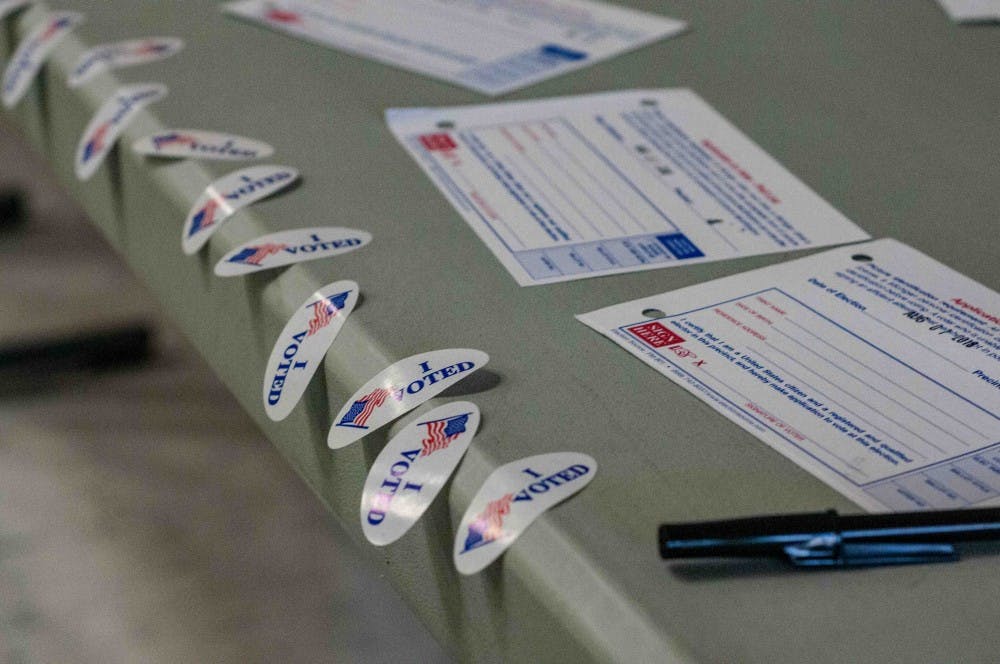The Aug. 7 Michigan primary election led to Gretchen Whitmer winning the Democratic nomination for governor, Bill Schuette winning the Republican nomination for governor, increased voter turnout across MSU’s campus and more.
Read more to get an idea of what candidates and agendas will be on the ballot when voters go to the polls for Michigan's Nov. 6 gubernatorial election.
Results of Michigan’s primary election
Gretchen Whitmer, MSU alumna and former Senate Democratic leader, won the Democratic nomination for governor over candidates Abdul El-Sayed and Shri Thanedar.
Whitmer will go up against Bill Schuette, current Michigan attorney general who won the Republican nomination for governor over candidates Brian Calley, Patrick Colbeck and Jim Hines.
Other results include Debbie Stabenow as the Democratic nomination for U.S. Senator, John James as the Republican nomination for U.S. Senator, Elissa Slotkin as the Democratic nomination for Representative in Congress 8th District and Mike Bishop as the Republican nomination for Representative in Congress 8th District.
Voter turnout across MSU’s campus
With most students gone from campus for the summer, election officials predicted that voter turnout in the primary election would remain low across MSU’s campus.
Election officials in IM Sports East, where residents in Precinct 13 and 14 vote, said 29 people had voted in Precinct 13 and 10 people had voted in Precinct 14 as of 6 p.m. the evening of the election.
By contrast, election officials said that only one person had voted in Precinct 13 and one person had voted in Precinct 14 the morning of the election.
According to numerous officials, turnout picked up in the afternoon.
In the MSU Union, where residents in Precint 12 and 15 vote, Precinct 12 had seen 31 votes and Precinct 15 had seen 57 votes by the evening of the election.
"Pretty good for August with the students gone," one election official in Precinct 12 said.
Precinct 12 only saw two voters and Precinct 15 only saw three voters in the morning of the election.
In Brody Square, where Precinct 1 residents vote, election officials also saw a steady increase of voting activity in the afternoon of the election. According to election officials in Precinct 1, they saw about 30 ballots cast by the evening.
Only three people had voted in Precinct 1 by the morning of the election.
One election official said that the precinct experienced a "suppertime rush," or an increase in voter turnout during dinner time.
Katherine Rifiotis, the new president of the Associated Students of Michigan State University, or ASMSU, said ASMSU registered over 2,500 incoming MSU students who attended the Academic Orientation Program, or AOP.
"The voter turnout for the summer in the primaries was the highest it's ever been in the recent history," Rifiotis said. "It was very, very significant and, for it to be in the summer, it's very hard."
Voter turnout across the rest of East Lansing
Support student media!
Please consider donating to The State News and help fund the future of journalism.
The Hannah Community Center on Abbot Road, where residents in Precinct 3 vote, experienced steady voting activity throughout the day of the election.
According to Bev Baten, an election official in Precinct 3 and a former city council member, the precinct had 642 voters cast ballots by the evening of the election, not including absentee ballots.
Baten said that Precinct 3 is large and that turnout remained "very steady here at this precinct."
She said that she believes the steadiness of the voter turnout is a result of the East Lansing income tax proposal that was on the ballot.
East Lansing tax proposal passes
The new income tax proposal that was on the ballot passed.
According to a press release from George Lahanas, East Lansing city manager, 61 percent of East Lansing citizens voted in favor of the proposal.
“The approval of the income tax will help us move the City forward with much-needed reinvestment in public safety and infrastructure, while also helping us to address our long-term challenges for the future financial sustainability of the City,” Lahanas said in the release. “The income tax will also prevent deep cuts to City services, including the closure of facilities and additional cuts to public safety.”
Under the new proposal, East Lansing residents will pay a 1 percent income tax and non-residents will pay a 0.5 percent tax.
The income tax will be implemented on Jan. 1, 2019, according to the press release.
According to an income tax study done by Plante Moran, the income tax is estimated to generate about $10 million annually, but with about $5 million less collected in property taxes.
Twenty percent of the income tax will go toward police and fire protection, 20 percent will go toward infrastructure, including maintenance and improvement of streets, sidewalks, water, sewer systems, parks and recreation and city-owned facilities, and 60 percent will go toward “supplemental payments for the unfunded pension liabilities for retired City employees,” the press release said.
The tax will expire after 12 years unless reauthorized by voters.
Discussion
Share and discuss “Results of Michigan's Aug. 7 primary election” on social media.







